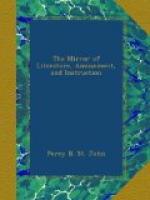In England Posts appear to have been established as early as the reign of Edward iii.; but the records of them handed down to us are obscure and uncertain. In the reign of Edward VI. they were however in full vigour: an Act of Parliament passed in 1548, which we have now before us, fixes the rate of postage at one penny per mile. The Posts here referred to were only used on important occasions. James I. erected a Post Office, which he placed under the control of Matthew de Questor; the office was claimed by Lord Stanhope, whose claim, however, was disallowed; but owing to the detection of de Questor in some mal-practices, the office was given and confirmed to W. Frizee and Thos. Witherings. In the year 1635, Charles I. erected a letter-office for England and Scotland, which he placed under the direction of the before-mentioned Thomas Witherings, who conducted it honourably, but was afterwards superseded for supposed abuses—a charge which was never proved. The rate paid about that time was “twopence for a letter, from 30 to 140 miles.” The Posts then established were shortly after extended to the principal roads of England, and were from time to time increased, till they were spread over the kingdom, to the great benefit of a commercial people.
The Post Office forms one of the chief branches of the revenue, and the total received for the conveyance of letters during the last quarter amounted to 33,000_l_.
The present arrangements of the Post Office, at least as far as they are known, the certainty of the transmission of letters, the economy with which it is conducted, are the theme of admiration by the nation at large, and more particularly by foreigners.
E.J.H.
* * * * *
ETHELBERT AND ELFRIDA.
An historical tale.
Night wanes apace!—The crowd
are gone;
The lamps have ceased to glow;
And Cynthia’s beams reflect upon
The placid lake below.
The song of mirth is heard no more;
No guests the goblet fill;
The banquet’s revelry is o’er,
All—all is hush’d
and still.
No more, amid the stately pile,
The dance afford’s delight;
Nor tale, nor jocund sports beguile
The silent hours of night.
All seek the downy couch of sleep—
The host, and worthy guest;
The drowsy guards on duty keep,
And envy them their rest.
No minstrels strike th’ enliv’ning
string—
None blow the twanging horn;
The nightingale has ceas’d to sing,
And slowly breaks the morn.
The portals of the dappled East
Assume their bright array;
The Sun, in new-born splendour drest,
Drives sable clouds away.
Thick vapours from the earth arise,
And pass away unseen,
Till night again shall veil the skies,
Now lucid and serene.




